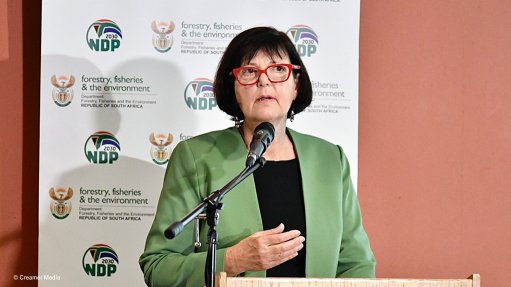African food sustainability needs greener production, less waste, PwC study shows
Greener food production methods and the avoidance of food waste are required to future-proof Africa’s food supply and to meet the expected future demand for nutrition in a sustainable way, says professional services firm PwC in its 'The sustainable food revolution: Future-proofing the world’s food supply' report.
Sustainability concerns are increasingly being understood and recognised across the continent, with food producers and their partners beginning to look at new sustainable agricultural practices. There is also a shift, with regulators beginning to shape new requirements, alongside consumers calling for change, PwC Africa says.
“The world needs to treat food security and affordability as critical issues for global prosperity and wellbeing. Just as agriculture was a key building block in the post-Second World War era of reconstruction, our food economy needs to be rebuilt again, but sustainably this time,” comments PwC Africa assurance partner Andrew Dale.
Africa, and the rest of the world, is facing a food crisis. Food shortages caused by supply chain disruptions emanating from various events across the world have amplified the long-term challenges to the sustainability of global food production, including population growth, climate change, and increased reliance on resource-intensive farming, the report shows.
However, there are several levers that the food industry can pull to meet the expected future demand for nutrition in a sustainable way without significantly increasing food prices. These include the avoidance of food losses in the supply chain, cleaner or greener methods of food production, and food substitutions at consumption level.
Regulation and standard setting will alter the structure and cost base of food production. This is already happening, with sustainability reporting cutting across the entire food supply chain and being seen as increasingly important by consumers and investors, the report notes.
Additionally, animal welfare standards will become a more significant driver of consumer choices, and the use of water and fertilisers will also become a more important metric of corporate sustainability performance, it adds.
Organic farming is one of the levers to move towards more diverse and less intensive forms of food production that also presents profit potential. A recent academic study on the performance of 55 crops grown on five continents showed that, despite higher labour costs and lower yields, organic farming is up to 35% more profitable than conventional high-intensity farming owing to the premium price organic products command, PwC says.
Similarly, agricultural production will increasingly be supported by technology like artificial intelligence (AI) and big data, allowing farmers a more focused and precise application of inputs such as water, light, fertiliser, pesticides and other soil treatments.
“These inputs increase productivity and, if used correctly, will reduce the environmental footprint. Agricultural technology and precision agriculture, such as imagery tools and AI, also provide farm monitoring and pest management solutions, helping farmers see above their crops and below the ground where the naked eye cannot,” the report states.
Further, while there are multiple causes of food loss in production and waste in retail and consumption, the chief causes lie within the distribution and retail process, PwC Africa consumer industrial products and services leader Nqaba Ndiweni points out.
“To fix the causes of food loss, supply chains need to become more transparent as societies are increasingly demanding reliable information on where their food comes from. Consumers also want to know about the ethical and sustainable practices of food producers, which influences the trust that producers build with their consumers.
“Without trust, industry players may struggle to build a solid reputation in the market along with a loyal and sustained customer base,” he says.
Meanwhile, the intensification of environmental regulation will impact on food companies directly in at least two ways, with the first being that mandated reporting on environmental, social and governance (ESG) performance will become an increasingly important factor in investor allocations, lowering the cost of capital for ESG-compliant businesses.
The second way environmental regulation will impact on food companies is through the emergence of hard targets for greenhouse gas emission reductions by 2050, or earlier, which will increase the cost of carbon-intensive agriculture, PwC highlights in the report.
“The current crisis is so profound that change is inevitable. Food industry stakeholders must change now on their own initiative or wait until they have to react to external pressures,” suggests PwC Africa sustainability leader Lullu Krugel.
“The food industry needs to optimise across a complex landscape covering procurement, production, storage, transportation and consumption, as well as shifting expectations on environmental and social justice.
“Now is a crucial time for every stakeholder to think about their role in this cycle of change, and how they can maximise on the impact of these changes on their business and wider societies,” she adds.
Comments
Announcements
What's On
Subscribe to improve your user experience...
Option 1 (equivalent of R125 a month):
Receive a weekly copy of Creamer Media's Engineering News & Mining Weekly magazine
(print copy for those in South Africa and e-magazine for those outside of South Africa)
Receive daily email newsletters
Access to full search results
Access archive of magazine back copies
Access to Projects in Progress
Access to ONE Research Report of your choice in PDF format
Option 2 (equivalent of R375 a month):
All benefits from Option 1
PLUS
Access to Creamer Media's Research Channel Africa for ALL Research Reports, in PDF format, on various industrial and mining sectors
including Electricity; Water; Energy Transition; Hydrogen; Roads, Rail and Ports; Coal; Gold; Platinum; Battery Metals; etc.
Already a subscriber?
Forgotten your password?
Receive weekly copy of Creamer Media's Engineering News & Mining Weekly magazine (print copy for those in South Africa and e-magazine for those outside of South Africa)
➕
Recieve daily email newsletters
➕
Access to full search results
➕
Access archive of magazine back copies
➕
Access to Projects in Progress
➕
Access to ONE Research Report of your choice in PDF format
RESEARCH CHANNEL AFRICA
R4500 (equivalent of R375 a month)
SUBSCRIBEAll benefits from Option 1
➕
Access to Creamer Media's Research Channel Africa for ALL Research Reports on various industrial and mining sectors, in PDF format, including on:
Electricity
➕
Water
➕
Energy Transition
➕
Hydrogen
➕
Roads, Rail and Ports
➕
Coal
➕
Gold
➕
Platinum
➕
Battery Metals
➕
etc.
Receive all benefits from Option 1 or Option 2 delivered to numerous people at your company
➕
Multiple User names and Passwords for simultaneous log-ins
➕
Intranet integration access to all in your organisation


















